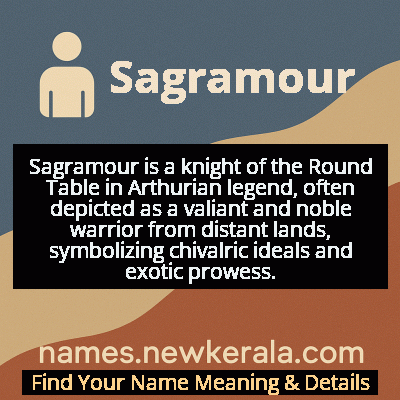Sagramour Name Meaning & Details
Origin, Popularity, Numerology Analysis & Name Meaning of Sagramour
Discover the origin, meaning, and cultural significance of the name SAGRAMOUR. Delve into its historical roots and explore the lasting impact it has had on communities and traditions.
Name
Sagramour
Gender
Male
Origin
Arthurian
Lucky Number
5
Meaning of the Name - Sagramour
Sagramour is a knight of the Round Table in Arthurian legend, often depicted as a valiant and noble warrior from distant lands, symbolizing chivalric ideals and exotic prowess.
Sagramour - Complete Numerology Analysis
Your Numerology Number
Based on Pythagorean Numerology System
Ruling Planet
Mercury
Positive Nature
Adventurous, dynamic, curious, and social.
Negative Traits
Restless, impatient, inconsistent, prone to indulgence.
Lucky Colours
Green, white.
Lucky Days
Wednesday.
Lucky Stones
Emerald.
Harmony Numbers
1, 3, 9.
Best Suited Professions
Sales, marketing, travel, entertainment.
What People Like About You
Versatility, charisma, adventurous spirit.
Famous People Named Sagramour
Sir Sagramore le Desirous
Knight of the Round Table
Prominent Knight of the Round Table featured in multiple Arthurian romances and quests
Sagramore of Hungary
Arthurian Knight
Knight of Hungarian origin serving King Arthur in medieval romances
Sagramour the Valiant
Literary Character
Victorian-era reinterpretation symbolizing medieval chivalric ideals
Name Variations & International Equivalents
Click on blue names to explore their detailed meanings. Gray names with will be available soon.
Cultural & Historical Significance
Extended Personality Analysis
The name Sagramour evokes a personality archetype characterized by intense passion, unwavering loyalty, and a relentless drive for achievement. Knights bearing this name are typically depicted as emotionally vibrant figures whose 'desirous' nature fuels both their greatest strengths and most challenging flaws. They approach life with fervent enthusiasm, whether in combat, courtly love, or questing for spiritual enlightenment. This passionate disposition often manifests as courage bordering on recklessness, making them formidable warriors but occasionally imprudent decision-makers. However, their deep-seated loyalty to king and comrades provides an essential counterbalance, ensuring their personal ambitions ultimately serve higher purposes. Modern psychological interpretations might view Sagramour personalities as representing the 'achiever' archetype - individuals motivated by external validation who gradually learn to find fulfillment in intrinsic values. Their character arcs typically involve tempering raw passion with wisdom, transforming impulsive desire into measured purpose. This makes the name particularly suited to characters who experience significant growth, learning to harness their intense energies while maintaining the core integrity that defines true chivalry.
Modern Usage & Popularity
In contemporary naming practices, Sagramour remains an exceptionally rare choice, primarily confined to literary circles, historical enthusiasts, and Arthurian revivalists. The name experienced its peak popularity during the 19th-century Victorian Arthurian renaissance, when medieval names saw renewed interest among the educated classes. Today, it appears occasionally in fantasy literature, role-playing games, and historical fiction as a character name that immediately signals Arthurian connections. While not featured on official baby name registries, Sagramour maintains a cult following among parents seeking unique, historically grounded names with strong narrative resonance. Its complexity and archaic spelling present barriers to mainstream adoption, but these same qualities appeal to those valuing distinctive names with deep literary heritage. Recent years have seen growing interest in Arthurian names overall, though Sagramour's specific usage remains limited to contexts where its medieval origins and chivalric connotations are specifically desired. The name continues to serve as a bridge between historical romance and modern fantasy traditions.
Symbolic & Spiritual Meanings
Symbolically, Sagramour represents the eternal human quest for meaning through passionate engagement with the world. The name embodies the archetypal journey from raw desire to refined purpose, mirroring the alchemical transformation of base impulses into noble aspirations. Metaphorically, it signifies the fire of aspiration that drives individuals toward excellence while challenging them to temper that fire with wisdom. The knight's characteristic 'desirous' nature speaks to fundamental human yearnings - for recognition, for connection, for transcendence - making Sagramour a powerful symbol of motivated existence. In broader symbolic systems, the name can represent the necessary tension between individual ambition and social responsibility, personal glory and collective good. It carries connotations of spiritual seeking, suggesting that even worldly desires can become pathways to higher understanding when properly directed. This rich symbolic layering makes Sagramour particularly valuable in literary and psychological contexts, where it can represent characters or concepts involving passionate transformation, chivalric idealism, and the perpetual human struggle to harmonize personal wants with universal values.

